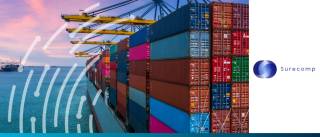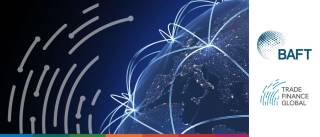Surecomp® has announced the completion of successful electronic bills of lading (eBL) transactions, bringing together multiple parties via its collaborative trade finance platform, RIVO™
TFG and BAFT have announced the launch of a Letter of Credit Guide. Read from leading experts on their definition, uses and intricacies!
As we sail through the choppy waters of global trade in 2024, we find ourselves in a world transformed by both financial and geopolitical shifts.
Letters of credit remain a core part of documentation in international trade. Despite the ease in cross-border payments facilitated by fintech companies, letters of credit continue to present themselves as indispensable documents in trade finance.
Learn about SBLCs: an irrevocable, independent financial security instrument to protect your investments and liabilities.
Navigate today’s economic landscape with the knowledge of commodities & trade finance. Learn how to make a bankable proposal.
Sustainability is one of the most used terms in the trade finance industry in 2023. While everyone knows what it means, and most know what the challenges are behind implementing sustainable actions, there is a clear issue with implementing tangible solutions.
As we bid farewell to 2023, it’s time to reflect on the dynamic landscape of global trade and finance. At Trade Finance Global (TFG), the past year has been marked… read more →
The overreaching arc of sanctions regulations is threatening the certainty of payments guaranteed by the smooth functioning of letters of credit (LC) in international trade. This tension recently played out in the Singapore courts in a judgment handed down recently (Kuvera Resources Pte Ltd v JPMorgan Chase Bank, N.A. [2023] SGCA 28).
International trade is vital to the growth of income and the country’s economy. It is, however, not possible to carry out any trade devoid of any risks.
With the passing of the UK’s Electronic Trade Documents Act (ETDA), the digital trade world is changing. While this is welcomed news for the entire industry, it also means that new partnerships and innovations need to come to fruition.
For ages, correspondent banking has played a vital role in the global payments system. Through correspondent banking relationships, banks gain access to a diverse range of financial products across various jurisdictions enabling them to offer cross-border payment solutions and services to their customers.
Lloyds Bank has initiated a strategic trade collaboration with UBS to bolster its global presence, aiding its UK-centric clientele to conduct business across 170 nations globally. Through this pact, the… read more →
In the geographically dispersed world of international trade finance, efficient communication is crucial.
This is why the Society for Worldwide Interbank Financial Telecommunication – better known as SWIFT – created its messaging types, which have long served as a means for banks around the globe to communicate and facilitate transactions.
With the disruption of the global value chains stemming from COVID-19 and the war in Ukraine, Central and Eastern European (CEE) trades are finding themselves in a new business reality. While trade with East Asia is a well-established import region, new primary export destinations are emerging for exporters in Central and Eastern Europe (CEE). With the Russian full-scale invasion of Ukraine, the main export markets outside the EU for the CEE companies, Russia, Ukraine and Belarus, were closed or significantly constrained.
 Australia
Australia Hong Kong
Hong Kong Japan
Japan Singapore
Singapore United Arab Emirates
United Arab Emirates United States
United States France
France Germany
Germany Ireland
Ireland Netherlands
Netherlands United Kingdom
United Kingdom















